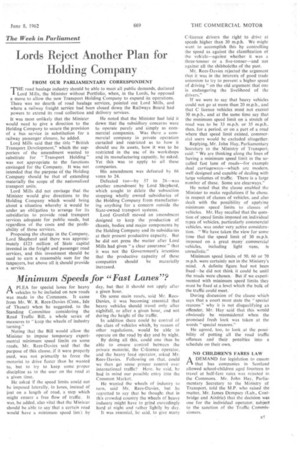Lords Reject Another Plan for
Page 31

If you've noticed an error in this article please click here to report it so we can fix it.
Holding Company.
FROM OUR PARLIAMENTARY CORRESPONDENT
THE road haulage industry should be able to meet all public demands, declared Lord Mills, the Minister without Portfolio, when, in the Lords, he opposed a move to allow the new Transport Holding Company to expand its operations. There was no dearth of road haulage services, pointed out Lord 'Mills, and where a railway freight service had been closed down the Railways Board had powers to extend its road collection and delivery services. .
It was most unlikely that the Minister would need to give a direction to the Holding Company to secure the provision of a bus service in substitution for a railway passenger closure, he added.
Lord Mills said that the title " British Transport Development," which the supporters of the amendment wanted to substitute for "Transport Holding" was not appropriate to the functions envisaged for the Company. It was not intended that the purpose of the Holding Company should be that of extending materially the scope of the nationalized transport units. Lord Mills did not envisage that the Minister would give directions to the Holding Company which would bring about a situation whereby it would be under an obligation to arrange for its subsidiaries to provide road transport services adequate for public needs, but regardless of the costs and the profitability of those services.
Proposing the change in the Company, Lord Shepherd said there was approximately 1123 million of State capital inveSted in the freight and passenger road services, and this investment should be used to earn a reasonable sum for the taxpayers, but above all it should provide a service. He noted that the Minister had laid it down that the subsidiary concerns were to Operate purely and simply as commercial companies. Was there a commercial company in private operation curtailed and restricted as to how it should use its assets, how it was to be restricted in the use of its workshops and its manufacturing capacity, he asked. Yet this was to apply to all these companies.
His amendment was defeated by 66 votes to 24.
Defeated too—by 57 to 26—was another amendment by Lord Shepherd, which sought to delete the subsection stopping wholly owned subsidiaries of the Holding Company from manufacturing anything for a concern outside the State-owned transport systems.
Lord Grenfell moved an amendment designed to keep the production of chassis, bodies and major components by the Holding Company and its subsidiaries at their present productive capacity. But he did not press the matter after Lord Mills had given " a clear assurance" that it was not the Government's intention that the productive capacity of these companies should be materially increased.




































































































